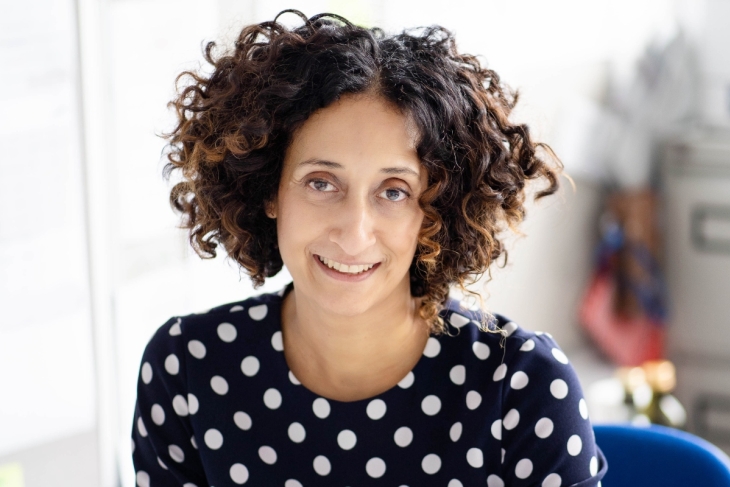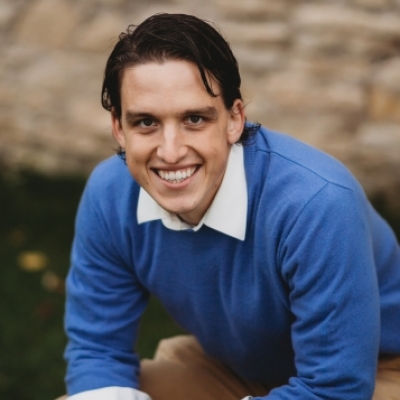Katharine Birbalsingh has many monikers: the founder and headmistress at Michaela Community School; chair of the Social Mobility Commission, an advisory body in England’s Department for Education; Commander of the Order of the British Empire; honorary fellow at New College, Oxford; Britain’s strictest headmistress; and of course, Miss Snuffy.
In 2010, she was tapped to give a speech at Britain’s Conservative Party conference, after which she was asked not to return to the school where she was employed. She eventually resigned and established her own school in 2014. A decade later, The Michaela Community School, a British free school comparable to an American charter school, which serves roughly 800 students ranging from eleven to eighteen, regularly boasts the highest growth scores of any K–12 educational institution in England.
Even with all those demands on her time, I had the opportunity to sit down with her recently for a conversation to figure out what exactly her school does to achieve such success.
I want to start at the beginning of your career with Michaela. You’ve resigned from your previous job. You’ve decided to found a school. Talk us through what that was like for you.
Well, in 2010 when we started, we had protestors outside and infiltrating our parent information events. They would shout to drown us out when we were trying to explain the new school to the potential parents who were interested. And it was really shocking, actually, because the parents were all Black moms from the inner city and the detractors were all White middle-class people, often from outside London, who had been bused in to destroy the hopes of these poor Black moms who were just looking for another option.
They would campaign outside with signs. They had picket lines with signs calling me names. We had to hire bouncers to protect us. When we finally opened, they stood outside and gave flyers to the children telling them their lives were in danger because health and safety standards had not been met in the building. So I went to the photocopier and copied the flyer 120 times and gave it to all the kids and then I said, “when you leave this evening, wave it in their faces and say, my headmistress has already given me a copy.”
That was the fun and games of 2014. We have been fighting with people ever since to stay alive.
Critics suggest that you’re imposing the strict discipline for which you have become known on students because they’re poor or Black or minorities, that teaching children to work hard and be nice is only teaching them to comply and be subservient. How do you respond?
Well, we are an inner-city school. Gangs are a problem. Alcoholism is a problem. Drugs are a problem. But you wouldn’t believe that if you came inside. The students are so well behaved, and they know so much—more than the children at the private schools.
Children like to be safe and looked after. When children feel safe, they’re more likely to push the boat out when it comes to their learning, like putting their hands up in lessons to trying out an interesting answer. If they feel that the bullies are in control, however, then the child will not expand their learning or take risks to try out new types of thinking.
Similarly, people don’t like the fact that our corridors are silent. They imagine that children normally skip through the corridors chatting about Aristotle. But I can tell you that, in the inner city, that is not what’s happening. Normally they’re pummeling each other, sending each other to hospital, screaming, shoving, and bullying. If children are safe in the corridor, they are much happier.
I think the people who make that criticism have never spent any time in the inner city or simply don’t know what it’s like to be in a school. If they were to spend any time there, then they would realize that what we do is what works.
Perhaps the polar opposite, at least rhetorically, to the discipline proponents is the “it’s all about relationships” crowd. Are relationships important?
Absolutely. It’s the number one thing we talk about at Michaela. When new staff come, we inundate them with training around relationships. If a child does not feel loved, and if the child does not love his teacher, he will not work for that teacher.
But we need to ask what enables a teacher to have strong relationships with their children. You need behavior systems that are applied equally and fairly to every child at all times. You will always have some teachers who are really great with kids, and they just have a way about them. And then there are other teachers who don’t have that skill. The consistency of the behavior systems enables all of your teachers to be able to build those relationships and to have an atmosphere of love.
It’s all well and good talking about relationships, but if you then deny schools consistent high-standard behavior systems, then you will never be able to connect with all of your children in a loving way.
Michaela is known for its discipline, but that’s not the only thing that sets it apart. What makes your instruction unique?
People think that in order for a child to be creative and think for himself, you must just let him go, that he’ll just figure it out and discover his love for French or science. That isn’t actually how children learn. They learn and get inspired when a passionate teacher gives them lots of knowledge, so our desks are in rows facing the teacher. The teacher is at the front of the classroom facing the children, leading the learning.
A more progressive classroom has the desks in groups where the children are looking at each other, not at the teacher, and it’s the children who are leading the learning. But when the teacher is leading the learning, they are able to teach the children so much because of course they know a lot more than the children. They have been doing this for many years, they have degrees, and the children are able to feel successful and happy.
Schools that spend their time with self-esteem lessons are wasting their time. All they need to do is teach the children properly. When children learn, it boosts their self-esteem. They feel really clever and successful. If you do it progressively, however, the child often thinks, “why am I so stupid?” And the ones who don’t have the same cultural capital coming from home sit in the classroom feeling very inadequate, eventually misbehave, get sent out of the lesson, and then that’s it for them. When they fail, we say it was because they were poor or Black. It is not because of those things. It was because we never taught them properly in the first place.
What does art look like at Michaela?
A progressive view of art instruction would be, “look at the fruit bowl and draw it.” Now, I remember being in art lessons at school where I would sit and think, “I don’t know how to draw a banana.” The fact is, I was never taught, for instance, that there are several different positions and places where you can hold a pencil, which allow a far lighter or darker shade on the paper. We start with those basics and build up from those basics so that the children actually learn how to draw.
It’s the same mentality that we have when teaching history. We will teach them the basics—some dates and general information. And over time, chronologically, we are building up their historical knowledge. That is what I think teaching should be. You break it down to its smallest component and then you build it back up again.
There seems to be this broad, progressive movement that’s just taking over education, be it instructionally progressive—let the kids do whatever they want—or very politically progressive—everything’s racist, we need to dismantle every system, deconstruct all of western society. Are we fighting a losing battle?
Well, you should never go down without a fight. I do think we are losing, but it doesn’t matter. You only have a hundred years if you’re lucky on this planet. You want to reach that age of 85 or 95 and look back on your life and think, I contributed. I made the world into a better place. That’s all you can do. It doesn’t matter if we lose. What’s important is that we contributed to the fight.
What’s next for Michaela?
Well, we have tried many times to expand. We tried to open a primary school. We were blocked. We tried to open a secondary school. That was stopped. We tried to set up a leadership program for other school leaders in the country, and that was blocked. So right now, we just want to survive.
I’m particularly concerned because the Labor Party will soon be coming into power. We were blocked at all those stages under a Conservative government, so you can imagine my worries with a Labor government. I’m hoping that they’ll just ignore us, given that we are very successful and we also hold values that tend to be the opposite to what they think. But you never know. Maybe they’ll come and see the school and be convinced and change some of their ideas. I do hope so.




